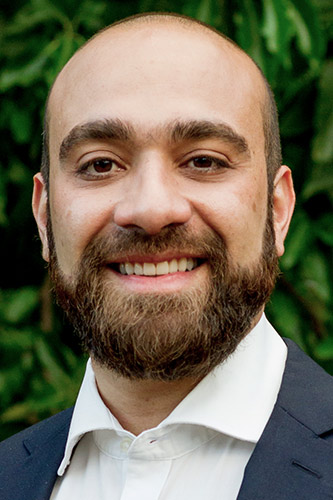

 The GNSO Council and the ICANN Board both seem poised to grant sufficient runway to the community to refine an idea for a simple ticketing system designed to centralize requests for registrant information disclosures and provide meaningful data that is likely to help ICANN staff enhance its assessment of the SSAD proposal. This is very good news for those who advocate for consumer safety and trust on the Internet, and it is very good news for the ICANN multistakeholder model.
The GNSO Council and the ICANN Board both seem poised to grant sufficient runway to the community to refine an idea for a simple ticketing system designed to centralize requests for registrant information disclosures and provide meaningful data that is likely to help ICANN staff enhance its assessment of the SSAD proposal. This is very good news for those who advocate for consumer safety and trust on the Internet, and it is very good news for the ICANN multistakeholder model.
 Marketers far and wide have piled onto the non-fungible token (NFT) craze. To some great success and fanfare, NFTs are being used to promote and monetize media, goods, and services in almost every segment. Media, Fashion, Entertainment, Sports, Gaming, Art, Beverage, Consumer Goods, Financial, and even Enterprise Software companies are getting into the mix. This brief review examines why, how, and where marketers are using NFTs, how NFTs are being abused and gives high-level advice to marketers and brand protection professionals.
Marketers far and wide have piled onto the non-fungible token (NFT) craze. To some great success and fanfare, NFTs are being used to promote and monetize media, goods, and services in almost every segment. Media, Fashion, Entertainment, Sports, Gaming, Art, Beverage, Consumer Goods, Financial, and even Enterprise Software companies are getting into the mix. This brief review examines why, how, and where marketers are using NFTs, how NFTs are being abused and gives high-level advice to marketers and brand protection professionals.
 Imagine that you run an organization out of a building. Imagine that the landlord comes one day and says, "Oh I didn't know you are a resident of country X or dealing with anybody from country X. I have to close this place down right now." And then you are done. You don't have an organization anymore. This very scenario happens on the Internet.
Imagine that you run an organization out of a building. Imagine that the landlord comes one day and says, "Oh I didn't know you are a resident of country X or dealing with anybody from country X. I have to close this place down right now." And then you are done. You don't have an organization anymore. This very scenario happens on the Internet.
 The EARN IT Act was reintroduced into Congress last Monday, with the promise that it would end Internet platforms' "blanket immunity" for "tens of millions of photos and videos" of child sexual abuse that they allow to circulate online. With the bill already scheduled for hearing in committee, it's on track to be passed quickly. And why shouldn't it be, if its sponsors' claims about it are true? Perhaps because they're not true.
The EARN IT Act was reintroduced into Congress last Monday, with the promise that it would end Internet platforms' "blanket immunity" for "tens of millions of photos and videos" of child sexual abuse that they allow to circulate online. With the bill already scheduled for hearing in committee, it's on track to be passed quickly. And why shouldn't it be, if its sponsors' claims about it are true? Perhaps because they're not true.
 Time has come again, another year of general elections in Brazil. Some 30,000 candidates are running for Executive and Legislative seats: 1 President, 27 State Governors, 27 Federal Senators, 513 Federal Deputies, 1059 State Deputies, 24 District Deputies to govern 212+ million people and one of the largest economies in the world. For a few lucky industries, success and failure do not correlate with who is in power; for others, policy and regulation are everyday business.
Time has come again, another year of general elections in Brazil. Some 30,000 candidates are running for Executive and Legislative seats: 1 President, 27 State Governors, 27 Federal Senators, 513 Federal Deputies, 1059 State Deputies, 24 District Deputies to govern 212+ million people and one of the largest economies in the world. For a few lucky industries, success and failure do not correlate with who is in power; for others, policy and regulation are everyday business.
 NameFind is a GoDaddy company that holds registrations of domain names and seeks to make money off of them by placing pay-per-click ads on parked pages found at the domain names. Global Licensing owns the DEJA VU trademark that is used in connection with strip clubs and other adult-related services. When NameFind used the domain name dejavushowgirls.com to set up a page of pay-per-click ads, Global Licensing sued, raising claims under the federal Anticybersquatting Consumer Protection Act (ACPA), 15 U.S.C. 1125(d).
NameFind is a GoDaddy company that holds registrations of domain names and seeks to make money off of them by placing pay-per-click ads on parked pages found at the domain names. Global Licensing owns the DEJA VU trademark that is used in connection with strip clubs and other adult-related services. When NameFind used the domain name dejavushowgirls.com to set up a page of pay-per-click ads, Global Licensing sued, raising claims under the federal Anticybersquatting Consumer Protection Act (ACPA), 15 U.S.C. 1125(d).
 The UK government launched its 2022 Cyber Security Strategy on 15 December 2021, outlining its ambitious plans to improve the resilience of UK institutions and businesses while protecting the country's interests in cyberspace. The strategy signals a more involved approach by the government, which previously relied heavily on the private sector for leadership. The government's stated commitment to a 'whole of society' approach sounds really good on paper, but what exactly does it really mean?
The UK government launched its 2022 Cyber Security Strategy on 15 December 2021, outlining its ambitious plans to improve the resilience of UK institutions and businesses while protecting the country's interests in cyberspace. The strategy signals a more involved approach by the government, which previously relied heavily on the private sector for leadership. The government's stated commitment to a 'whole of society' approach sounds really good on paper, but what exactly does it really mean?
 Recently, there has been an interesting development in the liability of Internet intermediaries in Germany, and I will comment here in this text. The "Act on Copyright Liability Online Content Sharing Service Providers" began to apply on August 1, 2021 in the country. This act is a German attempt to deal with the controversy generated by the approval in 2019 of the new European directive on copyright, specifically with article 17.
Recently, there has been an interesting development in the liability of Internet intermediaries in Germany, and I will comment here in this text. The "Act on Copyright Liability Online Content Sharing Service Providers" began to apply on August 1, 2021 in the country. This act is a German attempt to deal with the controversy generated by the approval in 2019 of the new European directive on copyright, specifically with article 17.
 On December 14, 2021, Dot Hip Hop, LLC (DHH) filed an Urgent Reconsideration Request following ICANN staff inaction (for its over four-month delay) of its Assignment Request for the .hiphop Registry Agreement. Not only did the ICANN Board Accountability Mechanisms Committee (BAMC) decide against considering the Reconsideration Request on an urgent basis, but on its last day of business for 2021, ICANN Org decided to retaliate against DHH for filing the Reconsideration Request in the first place ...
On December 14, 2021, Dot Hip Hop, LLC (DHH) filed an Urgent Reconsideration Request following ICANN staff inaction (for its over four-month delay) of its Assignment Request for the .hiphop Registry Agreement. Not only did the ICANN Board Accountability Mechanisms Committee (BAMC) decide against considering the Reconsideration Request on an urgent basis, but on its last day of business for 2021, ICANN Org decided to retaliate against DHH for filing the Reconsideration Request in the first place ...
 DataPrivacyBR and the Internet Integrity Task Force, IITF, in collaboration with CircleID and IGF recently held 2 online events focusing on digital citizenship, governance, and a digital bill of rights and responsibilities. A diverse group of high-level presenters and speakers spanning all stakeholder groups, addressed questions such as: What are the foundational principles that define and protect the rights and responsibilities of digital citizenship? Do existing internet governance models take digital rights sufficiently into account? Are there alternatives to business models that are based on digital exploitation and servitude? Why do we need a digital Bill of Rights and Responsibilities and how can it be created?
DataPrivacyBR and the Internet Integrity Task Force, IITF, in collaboration with CircleID and IGF recently held 2 online events focusing on digital citizenship, governance, and a digital bill of rights and responsibilities. A diverse group of high-level presenters and speakers spanning all stakeholder groups, addressed questions such as: What are the foundational principles that define and protect the rights and responsibilities of digital citizenship? Do existing internet governance models take digital rights sufficiently into account? Are there alternatives to business models that are based on digital exploitation and servitude? Why do we need a digital Bill of Rights and Responsibilities and how can it be created?